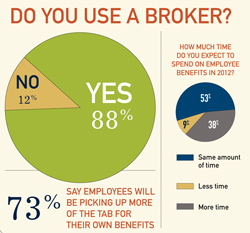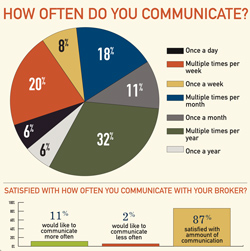With a poor economy, sad unemployment rates and that little issue called the debt ceiling to worry about, health care reform isn't the first indicator influencing decisions about employee benefits. At least that's what employers say.

According to the Benefits Selling 2011 Employer Survey, employers seem to suggest health care reform is less significant — with 72 percent of employers insisting reform is making them rethink employee benefit offerings. Overwhelmingly, employers (at 88 percent) say the economy has influenced—and continues to influence—employee benefits spending. [Read "Workers' confidence remains stagnant."]
One result economic conditions are having on employee benefits? Having employees pick up more of the tab. Lanelle McCrone, human resources generalist at the City of Naples Airport Authority, explains her employees now have to cover 10 percent of their health insurance when their company used to cover everything. And many are on the same page as McCrone: Of our survey respondents, 73 percent said their employees will have to foot more of the bill in the coming year.
Additionally, adds Jack Hyde, account executive at Fisher Brown Insurance, employers are now paying nothing for dependents.
“Employers are also cutting back on the medical benefits plans themselves, asking the employee to pay higher co-pays and deductibles,” he says.
And although the Patient Protection and Affordable Care Act requires employees' adult children up to 26 to be covered under their health plans, very few employers are doing so until it's federally required.
But it doesn't end there. Employers across the country are either cutting employees or putting the brakes on hiring.
Amber Hawkins, a small business owner (she owns and operates Your Computer Needs of Toledo, Ohio), says the economy and insurance rates are “a very high concern in my book.” Although she planned on hiring employees, she says she simply can't because of the economy.

“[If I did], I'd have to tell [employees] you'll be able to work but I won't be able to offer you this benefit or that benefit because I won't be able to pay for it. I'd rather not have any employees than do that to someone,” she says. “I don't want to hire anyone if they can't take advantage of health care that they need.”
The information from Benefits Selling's survey mirrors findings from the Society of Human Resource Management's own employer survey earlier this summer. They found a slight increase in the percentage of respondents whose benefits offerings have been negatively affected by the economy.
Eighty-five percent of respondents reported their organizations were feeling the impact of the economic downturn (27 percent reported being affected to a large extent and 58 percent to some extent), and 77 percent reported the employee benefits offerings have been negatively affected (12 percent reported being affected to a large extent and 65 percent to some extent).
“The HR job market is finally starting to bounce back after taking a big hit in 2009 and 2010, but it is still down, and most HR departments are still starved for resources. In this economy, opportunities will lag for people who need rules, structure and predictable work. Dealing with uncertainty and ambiguity is the new reality,” Bob Corlett, president of Staffing Advisors told SHRM researchers.
Last year's Benefits Selling employer survey reported virtually all employers were concerned about the impact of health care costs. A year later, there's much more going on that's impacting costs.
Complete your profile to continue reading and get FREE access to BenefitsPRO, part of your ALM digital membership.
Your access to unlimited BenefitsPRO content isn’t changing.
Once you are an ALM digital member, you’ll receive:
- Critical BenefitsPRO information including cutting edge post-reform success strategies, access to educational webcasts and videos, resources from industry leaders, and informative Newsletters.
- Exclusive discounts on ALM, BenefitsPRO magazine and BenefitsPRO.com events
- Access to other award-winning ALM websites including ThinkAdvisor.com and Law.com
Already have an account? Sign In
© 2024 ALM Global, LLC, All Rights Reserved. Request academic re-use from www.copyright.com. All other uses, submit a request to [email protected]. For more information visit Asset & Logo Licensing.








